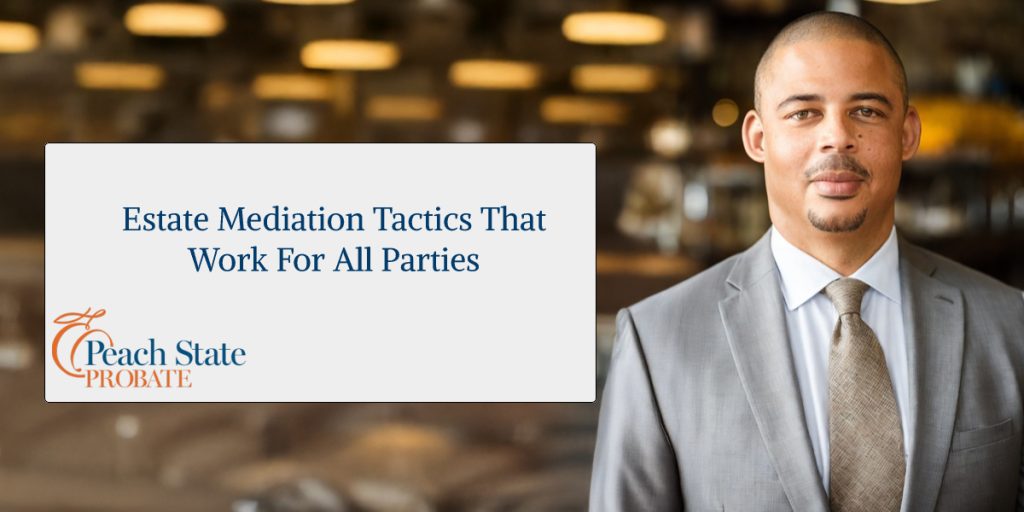## Effective Tactics for Estate Mediation That Benefit Everyone Involved
Estate mediation is a vital process that helps families navigate the complex emotional and legal terrain that arises after the passing of a loved one. Mediation offers a structured environment in which parties can communicate openly and reach agreements that honor the wishes of the deceased while also recognizing the needs and rights of all involved. The focus on estate mediation tactics that are effective for all parties serves to minimize conflict and foster cooperative relationships, making it an essential tool for anyone dealing with estate issues.
Every estate is unique, presenting its own array of challenges, conflicts, and emotional stakes. Effective estate mediation requires a nuanced approach that takes into account various personalities, relationships, and expectations. This article delves into proven tactics that not only facilitate resolution but also support long-term relationships among family members. The importance of estate mediation is underscored by its ability to produce outcomes that are beneficial for all parties while alleviating the stress commonly associated with probate disputes.
Ultimately, cultivating understanding and cooperation among parties can mitigate future conflicts and create a more amicable family dynamic. Legal professionals trained in estate mediation can guide families through this process, ensuring that everyone’s voices are heard and respected.
## Understanding Estate Mediation
At its core, estate mediation is an alternative dispute resolution (ADR) process specifically tailored to address conflicts that arise from estate planning and probate matters. Unlike litigation, which can be lengthy and costly, estate mediation focuses on collaboration and communication, providing a more amicable setting for parties to articulate their concerns and aspirations. Mediation is facilitated by a neutral third party, known as the mediator, who guides discussions and helps identify common ground.
The mediator’s role is to foster a safe environment where each party can express their views and desires without fear of confrontation. This environment encourages openness, leading to productive conversations that can yield innovative solutions. The primary goal of estate mediation is to reach a consensus that respects the intentions of the deceased while addressing the needs of the heirs or beneficiaries involved.
Additionally, estate mediation can help clarify misunderstandings related to estate documents (like wills and trusts) and can ease the emotional strain that often accompanies disputes within families. Instead of adversarial posturing, mediation allows families to work collaboratively toward a resolution that best reflects the wishes of their loved one.
## The Importance of Estate Mediation
Understanding the significance of estate mediation is essential for anyone dealing with the aftermath of a loved one’s passing. The emotional ramifications of losing a family member can exacerbate conflicts related to their estate, making mediation particularly important. The stakes are often high, as individuals may feel deeply connected to the estate and its assets, which can lead to heightened tensions. Through mediation, these tensions can be channeled toward constructive dialogue.
Moreover, the cost of litigation can weigh heavily on families already dealing with loss. Time-consuming court battles can quickly drain resources and extend emotional distress. Mediation offers a more cost-effective and efficient alternative, allowing families to reach settlements without the prolonged delays of a court case. This approach not only saves money but also preserves familial relationships by minimizing adversarial dynamics.
In a world where legal disputes can often lead to permanent rifts, estate mediation stands out as a proactive strategy for families to navigate their challenges together. It fosters a culture of compromise and collaboration, essential attributes for families facing such emotionally charged matters.
## Legal Framework and Context of Estate Mediation
The practice of estate mediation is governed by various state laws and legal principles, which can significantly impact how the process is conducted. In Georgia, for instance, estate mediation operates under the framework of the Uniform Mediation Act and relevant probate laws. These statutes provide guidelines on mediator qualifications, confidentiality issues, and the enforceability of mediation agreements. Understanding this legal backdrop is vital for effective mediation.
One key aspect of estate mediation is the confidentiality of discussions, which allows parties to speak freely without concern that their words might be used against them in future litigation. Mediators are required to maintain this confidentiality, ensuring that sensitive topics can be discussed honestly. Additionally, the legal framework provides mechanisms to enforce mediation outcomes, making it clear that once an agreement is reached, it holds legal weight.
In this context, legal professionals and experienced mediators play a crucial role in guiding parties through the process. Their familiarity with the regulatory environment ensures that mediation proceeds smoothly and that the final agreements are valid and enforceable under Georgian law. This commitment to maintaining legal integrity bolsters the confidence of all parties involved in the mediation.
## Real-World Applications of Estate Mediation
Estate mediation has shown remarkable effectiveness in real-world scenarios, illustrating its utility for families facing disputes. One common situation arises when siblings disagree about the distribution of a parent’s assets following their passing. Consider a case where two siblings inherit a family home but have different ideas about its future use. Mediation provides a space for them to explore their respective emotional attachments, financial needs, and aspirations for the property. Through guided discussions, the mediator may help them reach a compromise, such as selling the house and equally splitting the proceeds or agreeing to co-own the property.
Another poignant example can be observed when dealing with the complexities of blended families. In cases of remarriage, previous children might face challenges when navigating the wishes of their deceased parent alongside the interests of their stepparents or half-siblings. Estate mediation lets all parties voice their concerns in a respectful manner, addressing potential issues like access to family heirlooms or the division of financial assets. The neutral mediator can facilitate conversations that account for mixed family dynamics, encouraging empathy and understanding among conflicted members.
Moreover, mediation’s adaptability allows it to be utilized in varying contexts, from formal legal disputes to informal family discussions. The insights gained during these mediation sessions can lead to meaningful resolutions that not only fulfill legal requirements but also demonstrate compassion and sensitivity towards family relationships.
## Practical Steps to Engage in Estate Mediation
For families considering estate mediation, understanding the steps involved is essential for a successful experience. Initially, parties need to identify their individual concerns and aspirations related to the estate. This preparation can involve listing out specific issues they wish to address, such as asset distribution, debt responsibilities, or even emotional grievances that need acknowledgment.
Once parties are clear on their individual positions, the next step is to contact a professional mediator with a background in estate issues. It is critical to choose a mediator who not only possesses knowledge of relevant laws but also has experience managing estate disputes. Scheduling a preliminary meeting can allow families to ask questions and understand the mediator’s approach to facilitating discussions.
At the mediation session, family members will be encouraged to express their views and concerns honestly. The mediator will aim to create an environment where all parties feel heard and discontent is addressed. Effective mediation hinges on the willingness of parties to work collaboratively, so it’s essential to approach this process with an open mindset. Throughout this experience, families can expect the mediator to help steer discussions productively, focusing on shared goals rather than deepening conflicts.
## Common Pitfalls During Estate Mediation
Even with the best intentions, misunderstandings can occur during estate mediation that may derail the process. It is crucial for participants to avoid common mistakes that can compromise their efforts. One pitfall is entering the mediation process without adequate preparation. Failing to articulate concerns clearly or having unrealistic expectations about the outcomes can lead to frustration or emotional escalation. Each party should take the time to prepare, identifying not only their desires but also areas where they might be willing to compromise.
Another frequent mistake is underestimating the importance of neutrality. Personal emotions can cloud judgment, making it challenging to communicate effectively. Parties may unintentionally focus on past grievances instead of the issues at hand, causing discussions to devolve into conflict rather than collaboration. A neutral mediator can help redirect conversation, but it is equally important for participants to consciously strive to maintain focus on resolving the current issues rather than rehashing past resentments.
Lastly, some parties might neglect the importance of documenting agreements reached during mediation. To ensure clarity and enforceability, it’s essential to memorialize decisions within a legally binding document. Without this step, well-intentioned agreements can become sources of confusion or conflict later on.
## Knowing When to Seek Legal Guidance in Estate Mediation
Recognizing when to consult an attorney during estate mediation is vital for ensuring that individuals’ rights and interests are properly protected. In many cases, it may be advantageous to seek legal guidance before and throughout the mediation process. Individuals may benefit from consulting an attorney knowledgeable about estate law to assist them in preparing for mediation, providing foundational insights into their rights and obligations.
Should conflicts arise during mediation that cause parties to feel overwhelmed or uncertain, having legal counsel present can help clarify issues and provide added reassurance. An attorney can offer valuable perspectives on the legal implications of specific agreements and highlight potential consequences that may not be immediately obvious to the parties involved. This support can be paramount, especially in more complex cases involving significant assets or complicated familial relationships.
Finally, if the mediation process reaches an impasse, an attorney can help navigate formal legal steps, whether that means pursuing litigation or re-evaluating mediation strategies. Given the emotionally charged nature of estate disputes, legal professionals can offer the expertise needed to identify viable pathways forward, ensuring that parties are kept informed and legally compliant.
## The Advantages of Legal Representation in Estate Mediation
The benefits of having legal representation during estate mediation cannot be overstated. An attorney well-versed in estate law brings valuable insights and an understanding of legal rights and responsibilities that may otherwise be overlooked. This knowledge enables clients to navigate discussions with assurance, knowing that their interests are being safeguarded.
Legal representatives can also assess whether proposed mediation agreements are fair and equitable. They can explain the long-term implications of certain decisions, ensuring that their clients make informed choices during mediation. This level of guidance is particularly important for individuals who might be unfamiliar with estate laws and their constraints. For instance, they might unknowingly agree to distribution methods that differ from the decedent’s actual wishes or that could create tax implications down the line.
Moreover, attorneys play a crucial role in fostering effective communication among participants. They can help articulate clients’ positions clearly and assertively while simultaneously maintaining an atmosphere of respect and cooperation. This balance is invaluable in reducing emotional friction and keeping discussions focused on constructive outcomes.
## How Peach State Probate Facilitates Effective Estate Mediation
Peach State Probate is dedicated to providing comprehensive support for families undergoing the estate mediation process. With a nuanced understanding of Georgia’s estate laws, the team effectively guides clients through mediation, ensuring that rights are protected and agreements reached are both fair and enforceable. Their approach centers on empathetic understanding of familial dynamics and the emotional complexities involved in estate matters.
The firm prioritizes creating a safe and open environment where all parties feel heard. Mediators at Peach State Probate utilize proven strategies to facilitate constructive discussions, helping families navigate their disputes with sensitivity. They work tirelessly to promote collaborative solutions, enabling families to reach agreements that acknowledge everyone’s needs while honoring the legacy of their loved ones.
Additionally, Peach State Probate is committed to keeping clients informed at every step. The legal team’s proactive communication ensures parties are aware of their rights and obligations throughout the mediation process. This transparency fosters trust and confidence, making for a smooth mediation experience.




